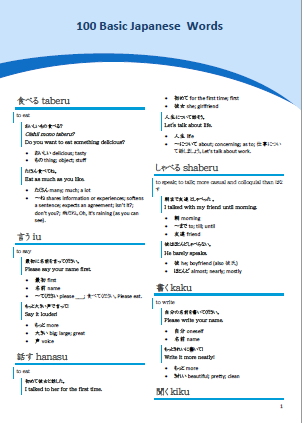4 June 2020
Itadakimasu! A Guide to Japanese Meal Time Words and Phrases
(This article was reviewed and edited by native Japanese speakers to ensure accuracy.)
Meal times are an important part of Japanese culture. Wide varieties of food are everywhere, especially in big cities. Even on Japanese T.V., you might notice there are more shows and segments related to cooking and food than other countries. Anime and manga also often feature storylines like becoming a professional chef or patissiere.
Food and meals are such a central part of the culture, that there tends to be many different words and phrases compared to English.
Basic meal words

The following words all mean “meal” in Japanese. These words can be used at any time of day, and it doesn’t specify the timing of the meal. Since Japanese has varying levels of formality in the language, there are differences in the politeness levels of these words.
ごはん – Gohan
This word, also written ご飯, literally means “rice” but it can also mean “meal”. In Japanese cuisine, rice is considered as the 主食(Shushoku) or “staple food”. Back in the day, most people ate meals that consisted of rice, soup, and side dishes. This is why the same word for “rice” is used for the word “meal”.
ごはん, is mainly used in casual Japanese with friends and family. Here are a few sentences where ごはん is used as the word “meal”:
ごはん何がいい?
Gohan nani ga ii?
What do you want to eat?
今日、ごはん外で食べてくる。
Kyou, gohan soto de tabete kuru.
I’m going to eat out today.
Here are also some situations where ごはん is used for the word “rice”:
パンとごはん、どっちが好き?
Pan to gohan, docchi ga suki?
Do you prefer bread or rice?
ごはん炊けた?
Gohan taketa?
Is the rice cooked?
食事 – Shokuji
This word for “meal” has a more formal and respectful image. The two kanji means “eat” (食) and “things” (事). It’s commonly used in polite situations or when referring to a fancier sit-down meal.
今度、食事でもどう?
Kondo, shokuji demo dou?
How about going for a meal next time?
食事の仕度しなきゃ。
Shokuji no shitaku shinakya.
I have to prepare the meal.
When using 食事 it becomes more polite if you add お. This can be especially useful when talking to someone who is higher in social status or hierarchy.
これからお食事でもいかがですか?
Korekara oshokuji demo ikaga desu ka?
Would you like to go for a meal?
飯 (メシ) – Meshi
This word also comes from the word “rice” and means “meal”. It is a very informal way of speaking and it’s normally used by men. It has a masculine nuance and it’s best to use it with those who are of lower or equal social status.
飯にしない?
Meshi ni shinai?
Shall we eat?
Breakfast
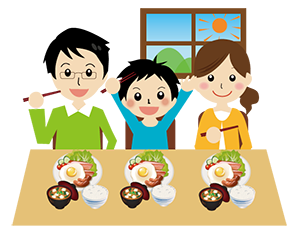

Similarly to the words for “meal”, the following words mean “breakfast” in various levels of formality. The word “morning”, 朝 (asa), is attached to each of the basic meal words to form the word “breakfast”.
朝ごはん – Asagohan
This word works similarly to the word ごはん except that it refers to breakfast. It is a casual way of saying breakfast.
朝ごはん食べる人?
Asagohan taberu hito?
Who wants breakfast?
朝食 – Choushoku
Like the word 食事, this is also a more formal way of saying breakfast. It’s often heard or used when eating out for breakfast, such as in hotels.
ホテルに朝食ついてる?
Hoteru ni choushoku tsuiteru?
Is there breakfast at the hotel?
朝食は一階になります。
Choushoku wa ikkai ni narimasu.
The breakfast is on the first floor.
朝飯 – Asameshi
This is the most informal version of the word “breakfast”. It is mostly used by men and functions like the word, 飯.
朝飯まだ?
Asameshi mada?
Is breakfast ready?
Lunch
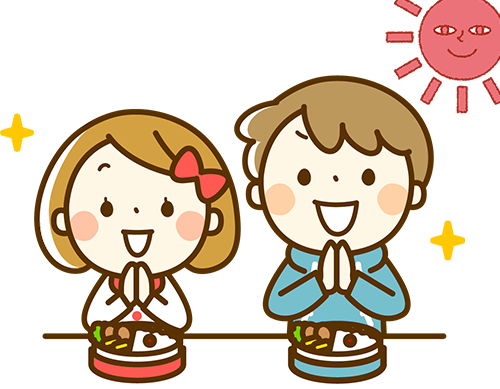

There are many different ways of saying “lunch” in Japanese. It’s reflected by the fact that people might be out of the house during lunchtime; work, school, or dining out. Adding the word 昼 (hiru), or noon, to the words for “meal” can turn them into “lunch”.
昼ごはん – Hirugohan
This word for “lunch” can be directly translated as “noon rice”. As explained earlier, the word rice, ごはん, has become synonymous with the meaning for “meal” in Japanese. 昼ごはん is the word used more commonly among friends and family.
昼ごはんもう食べた?
Hirugohan mou tabeta?
Did you eat lunch yet?
昼食 – Chuushoku
This is a polite and more formal way of saying “lunch”. It may be used by event coordinators, hotels, or other service industries.
三ツ星レストランでの昼食となります。
Mitsuboshi resutoran de no chuushoku to narimasu.
Lunch will be served at a three-star restaurant.
昼食は隣の部屋に用意しております。
Chuushoku wa tonari no heya ni youi shite orimasu.
Lunch will be served in the room next door.
昼飯 – Hirumeshi
Because of the word 飯, this is the most informal form of saying “lunch”. It’s used mainly by men when talking to someone of equal or lower social status.
今日の昼飯どうする?
Kyou no hirumeshi dousuru?
What should we have for today’s lunch?
お昼 – Ohiru
This is the most versatile way of saying “lunch”. It simply adds an お, as a polite form, to the word 昼, or noon. It can casually be used among friends and family.
そろそろお昼にしましょうか。
Sorosoro ohiru ni shimashou ka.
Shall we have lunch soon.
お母さん、お昼まだ?
Okaasan, ohiru mada?
Mom, is it lunch yet?
It can even work in certain polite situations. For example, it would be possible to say this to your boss:
お昼はどうされますか?
Ohiru wa dou saremasu ka?
What is your lunch plan?
However, in service industries towards customers or in big events, it’s important to know that the word “lunch” would not be お昼, but 昼食.
ランチ – Ranchi
This is a borrowed word from English. It’s simply “lunch” written in katakana. Japanese people feel that words from other languages are more hip or trendy. In the case of the word ランチ, women and girls might use this word to sound more stylish. Also, many cafes and restaurants will display this word to appear more attractive.
ランチ行かない?
Ranchi ikanai?
Do you want to go for lunch?
ランチはじめました。
Ranchi hajimemashita.
We started serving lunch.
お弁当 – Obento
This is a very important part of Japanese culture and refers to a “packaged lunch”.
お弁当 usually consists of rice and side dishes in a container. It has a long history and possibly originates from the 12th century. It is also said to come from the word “convenient” in Chinese.
These days, お弁当 not only comes in the form of rice and side dishes, but there are also packaged sandwiches or cute character お弁当 called キャラ弁 (kyaraben).
お弁当 are either made at home or bought outside in convenience stores or train stations.
美味しそうなお弁当だね。
Oishisou na obento da ne.
That packaged lunch looks delicious.
今日はお弁当いらない。
Kyou wa obento iranai.
I don’t need a packaged lunch today.
給食 – Kyuushoku
This means “school lunch” and is a combination of 給 (kyuu), meaning “to give out” and 食 (shoku), meaning “to eat”.
It is not simply a school lunch, but it consists of a balanced and fresh-cooked meal. The students help out with serving the meal. It also helps teach young students about nutrition and to be grateful for the food.
今日の給食何だった?
Kyou no kyuushoku nan datta?
What was today’s school lunch?
Snack/afternoon tea


おやつ – Oyatsu
This is one of the most casual and childish ways of saying “snack”. Parents will often use this word with their children. There is a phrase in Japanese called 三時のおやつ (Sanji no oyatsu), which means “three o’clock snack”. Japanese children often associate snack time being around 3pm.
今日のおやつ何?
Kyou no oyatsu nani?
What’s today’s snack?
おやつの時間が楽しみ!
Oyatsu no jikan ga tanoshimi!
I’m excited for snack time!
軽食 – Keishoku
This refers to a light meal or snack that might be given out at meetings, airplane flights, or when working over-time. It’s a word that is used in formal situations that signifies that the food will not be a meal but something like a snack.
軽食をご用意しております。
Keishoku o goyoui shite orimasu.
We have prepared a light meal.
お茶 – Ocha
In English, we might be used to saying “let’s grab a coffee” or “ do you want to go to a cafe?”. However, in Japanese, the culture of tea is so important that all of these might be expressed with the term お茶, meaning “tea”. It doesn’t necessarily mean only “tea” but it could be coffee, snacks, cake, tea, or other traditional sweets. You can use it to ask people to come for afternoon tea or going out to a cafe.
今度お茶しない?
Kondo ocha shinai?
Do you want to go for tea sometime?
Dinner
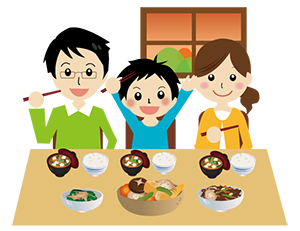

Similarly to the words for lunch, the words for dinner are also mostly compound words made of a meal word and the time it is eaten. However, there are more words for evening or night in Japanese like 夜, 晩, 夕 which can be confusing.
晩ごはん – Bangohan
This is another compound word with ごはん combined with 晩(ban) which means “night”. This refers to the time period after the sun sets when most people are still awake. It is used casually among friends and family.
晩ごはん何がいい?
Bangohan nani ga ii?
What do you want for dinner?
晩飯 – Banmeshi
This word replaces ごはん with 飯 which makes it much more informal than 晩ごはん. Like all 飯 words, it is mostly used by men.
晩飯食いに行こう。
Banmeshi kui ni ikou.
Let’s go eat dinner.
夕食 – Yuushoku
This word combines 夕(yuu) which means “evening” or the time that the sun is about to set, and 食(eat). Since it is a word with 食, it is a formal and polite form of saying “dinner”.
夕食はホテルになります。
Yuushoku wa hoteru ni narimasu.
Dinner will be at the hotel.
ディナー – Dinaa
Like the word ランチ, this word is also a borrowed English word. It simply means “dinner” and written in katakana. It gives off a trendy and western feel, so many posh restaurants will use this word. It can also be used when you want to talk about a nice sit-down dinner.
ディナーはご予約をおすすめします。
Dinaa wa goyoyaku o osusume shimasu.
Reservations are recommended for dinner.
夜ごはん – Yorugohan
This is a word that can also be interchangeable with 晩ごはん or 夕ごはん. 夜 in 夜ごはん technically means late-night, but in this context all of the dinner ごはん words are exchangeable. It’s important not to confuse it with 夜食 which means “late-night snack”.
夜ごはん何がいい?
Yorugohan nani ga ii?
What do you want for dinner?
夕ごはん – Yuugohan
This word uses 夕 in front of ごはん, and would technically refer to an early dinner when the sun is setting. However, it can basically be used interchangably 晩ごはん or 夜ごはん.
夕ごはん何がいい?
Yuugohan nani ga ii?
What do you want for dinner?
夜食 – Yashoku
This word refers to a small late-night meal or snack and it would not be considered dinner. It would be used in situations when you stay up late enough to get hungry again. The difference between 夕食 and 夜食 is that the kanji, 夜(yoru), refers to the time of day when people are asleep.
夜食にカップ麺食べた。
Yashoku ni kappumen tabeta.
I ate cup noodles for my late-night snack.
Meal time verbs:
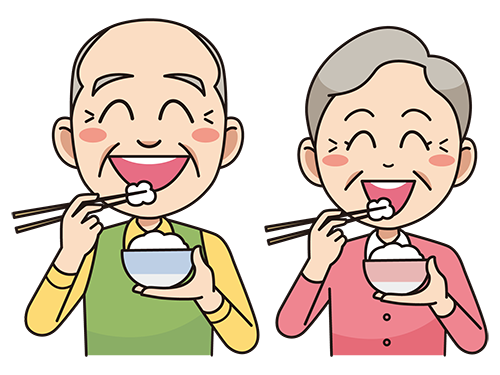

There are many verbs that are related to meal times, and some may not be as intuitive from an English-speaking perspective. It can be tricky because they can change their meaning when used in different contexts.
食べる – Taberu
One of the most straightforward verbs, this simply means “to eat”.
何食べる?
Nani taberu?
What do you want to eat?
まだ食べてないの?
Mada tabete naino?
Have you eaten yet?
It’s important to note that the words ごはん, 朝ごはん, 昼ごはん, and 夜ごはん will usually pair with 食べる, when referring to eating these meals.
もう朝ごはん食べた?
Mou asagohan tabeta?
Have you already eaten breakfast?
食べる can also sometimes be used as 食う (Kuu), which is the form that would most likely go with the words 飯, 朝飯, 昼飯, 晩飯. It is a very informal way of saying “to eat”, that men may use.
もう夕飯食ったよ。
Mou yuumeshi kutta yo.
I already ate dinner.
取る – Toru
This verb means “to take”. In a meal time context, it is a more polite way of saying “to eat” or “to have” a meal. It usually accompanies the words 食事、朝食、昼食、or any meal word with 食. Because this is more formal, it would be weird to use it with words like ごはん or 飯.
行く前に軽く昼食とろうか。
Iku mae ni karuku chuushoku torouka?
Shall we have a light lunch before we go?
残す – Nokosu
In Japanese culture, it can be considered rude to leave food on your plate.
This verb, which means “to leave”, can be used to talk about leaving food. It’s something that parents and teachers often tell children.
残さないで食べましょう。
Nokosanai de tabe mashou.
Let’s eat without leaving food.
出る – Deru
This verb means to “put out” or “go out”, but means “to serve” in a meal time context. You can use this verb to talk about food that you will serve someone or food that was served to you.
昼食はラーメンが出た。
Chuushoku wa raamen ga deta.
Ramen was served for lunch.
盛る – Moru
This can be an interesting verb because it also means “to serve”, “to plate”, or “to pile something”. It’s used when talking about foods that can be “piled” onto a plate or bowl.
どれくらいごはん盛ればいい?
Dorekurai gohan moreba ii?
How much rice should I serve?
It’s especially useful when asking for larger portions of rice or other dishes. The large portion would be called 大盛り(oomori) and can be an option in some restaurants and eateries.
ごはん大盛りでお願いします。
Gohan oomori de onegaishimasu.
I would like a large portion of rice, please.
飲む – Nomu
This is the verb “to drink”. It can be used similarly to how we use the word “drink” in English. The same verb can be used for drinking alcohol or going to a bar.
何飲む?
Nani nomu?
What do you want to drink?
今日、飲みに行かない?
Kyou, nomi ni ikanai?
Do you want to go for a drink today?
Other mealtime phrases and words
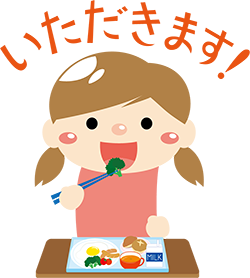

いただきます – Itadakimasu
This is a phrase that is used before eating a meal. It can show appreciation for the food and the person who made it. It’s common to put your hands together and say いただきます.
The phrase itself comes from いただく, which is a polite way to say “to take” or “to have”. It means something like “I will take/have this food” and can be comparable to “bon appétit” or “let’s eat”.
It’s common for Japanese people to say it before every meal, especially when they’re eating with other people. If you are invited, you should most definitely say this before eating.
今日のお昼美味しそう。いただきます!
Kyou no ohiru oishisou. Itadakimasu!
Today’s lunch looks delicious. Bon appétit!
めしあがれ – Meshiagare
The person who made the food might say めしあがれ and means something like “please eat”.
It’s usually a response to the phrase いただきます. It’s important to keep in mind that this phrase is usually directed to people of equal or lower social hierarchy. For example, adults might say this to children.
This phrase is much less common compared to いただきます in real life.
どうぞ、めしあがれ。
Douzo, meshiagare.
Go ahead, please eat.
ごちそうさまでした – Gochisousama deshita
After finishing the meal, it is polite to say ごちそうさまでした. ごちそう means a “delicious meal” or “feast”. The whole phrase means “it was a delicious meal” or “thank you for the meal”. It shows gratitude and appreciation to use this phrase.
If you are invited, it will be a polite thing to say when you finish eating. You can also say this when you leave.
ごちそうさまでした。とっても美味しかったです!
Gochisousama deshita. Tottemo oishikatta desu!
Thank you for the meal. It was very delicious!
お腹が空きました – Onaka ga sukimashita
In Japanese, the phrase for “being hungry” is お腹が空きました. It literally translates to “my stomach is empty”.
ランニングをしたらお腹が空きました。
Ranningu o shitara onaka ga sukimashita.
After running, I feel hungry.
あー、めっちゃお腹空いた。
Aa, meccha onaka suita.
Ah, I’m really hungry.
腹が減る – Hara ga heru
This is the informal version of お腹がすきました. In this phrase, it uses the verb 減る(heru) which means ”to decrease”. This way of speech is used mostly by men. It should also only be used with those of equal or lower social status than you.
腹減ったんだけど、ご飯まだ?
Hara hettandakedo, gohan mada?
I’m hungry, is the food ready?
お腹がいっぱいです – Onaka ga ippaidesu
This phrase also uses the stomach as the one determining the level of hunger. The phrase literally means “my stomach is full”. In Japanese, when referring to levels of hunger, you always have to talk about your stomach.
もう結構です。お腹がいっぱいです。
Mou kekkou desu. Onaka ga ippai desu.
It’s alright. I’m full.
もうお腹いっぱいだよ。
Mou onaka ippai da yo.
I’m already full.
腹いっぱい – Hara ippai
This is the informal version of お腹がいっぱいです. It’s mainly used by men and should only be used with those of equal or lower social status.
あー、すし腹いっぱい食いてー。
Aa, sushi hara ippai kuitee.
Ah, I want to eat sushi till I’m full.
おかわり – Okawari
This is the word for “seconds”, when you might want to get another helping of food. In Japanese, the concept of getting seconds might be more common than in the English speaking countries because of the tradition of eating rice and many side dishes. To balance out the salty flavors of the side dishes, it’s common to ask for a second helping.
ごはん、おかわり出来ますか?
Gohan, okawari dekimasuka?
Is it possible to have another helping of rice?
おかわり自由です。
Okawari jiyuu desu.
Free refills.
自炊 – Jisui
This is a word that means “to cook at home”. It comes from the kanji 自(yourself) and 炊(to cook). The kanji 炊, means “cook” but refers more to making rice.
This word represents the traditional Japanese eating style which assumed that if you are at home you would mainly eat rice and side dishes. Nowadays, it simply means that you cook at home and live alone.
いつも自炊してます。
Itsumo jisui shitemasu.
I always eat and cook by myself.
